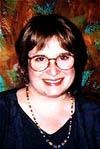ABOUT THIS PROJECT (Home)CONVERSATIONS ABOUT THE PAST
|
Levi Jordan
|
 Carol McDavid
|
|
| I
hold a Master's Degree from the Department of
Anthropology at the University of Houston, and am
currently a Ph.D. candidate at the University of
Cambridge, England. In addition to my graduate study, I
have also taught at the University of Houston and serve
as Secretary of the Levi Jordan Plantation Historical
Society, where my work involves coordinating plans for
the public interpretation of the archaeology of the Levi
Jordan Plantation (including putting together this web
site). In addition to my master's thesis (12), I have given several papers about various aspects of my work at the plantation (6,7,8,9,10,11), some of which will be included on this web site in the future. I have also co-edited a special issue of Historical Archaeology, the journal for the Society for Historical Archaeology (13). This volume includes a paper describing my master's research (14), which focused on whether it would be feasible to create a public interpretation of the Jordan Plantation archaeology. My present research involves looking at whether hypertext, the computer "language" used to present web sites, is a useful way of creating public interpretations of so-called "sensitive" historical and archaeological material. An synopsis of what I am trying to do with this research is attached. I am presented paper on this topic at the 1998 Annual Meeting of the Society for Historical Archaeology, and it will be included on this web site after it is presented. The abstract for this paper is below. My other papers about this topic (including one to be given at the World Archaeology Conference in Capetown, South Africa in 1999) will also be included on this web site in the future. "Archaeology and 'The Web': Writing multi-linear texts in a multi-centered community""Web sites" about archaeological sites proliferate as archaeologists utilize the Internet to present information about their findings. However, there has been little systematic research aimed at understanding whether hypertext, the textual form used to create "Web sites", is an effective way to communicate archaeological information. Because hypertext offers a multi-linear, decentered, potentially interactive way of presenting archaeology, it may be useful when dealing with information that is more "sensitive" and contested in present-day social and political contexts. This paper will examine the collaborative creation of a "Web site" designed to publicly present the archaeologies and histories of the Levi Jordan Plantation. Working with local schools and other community groups, archaeologists and local citizens are working together to examine whether computer-mediated learning (including hypertext) can provide opportunities for people to conduct critical dialogues with archaeologists, with each other, and with "the past".
I am also interested in how philosophical ideas might be utilized more effectively by archaeologists, and am co-chairing a session entitled "Pragmatism in Archaeology" for the upcoming annual meetings of the American Anthropological Association. That abstract is below. Visit the AAA web site for more information about the American Anthropological Association annual meetings. Following is the abstract for my AAA paper. "Archaeology as Cultural Critique: A pragmatic framework for community collaboration in the public interpretation of the archaeology of a southern plantation" (Abstract for paper)Pragmatist philosophy, rooted in the Emersonian ideal that the world can be made better through individual human effort, is intensely practical, progressive, democratic, and optimistic. It advocates academic participation in social, cultural, and political life and calls for academic engagement with the events and affairs of the world. By demystifying the scientific method and providing a way of understanding it as a set of distinct social practices by which knowledge is produced (by "bringing it down to earth") a pragmatic approach can make science more accessible as a tool for community collaboration and reform. It takes seriously the role of the future in human activity, while demanding and being informed by an active historical consciousness. As it mediates between "old" truths and "new" forms of knowledge, and the role of human agents in the production of both, a pragmatic archaeology can provide a productive, creative framework for communities to evaluate archaeological research and to assimilate it into particular social and political contexts. This paper will examine the utility of a pragmatic approach as the descendants of both owner and slave residents of a southern plantation collaborate to publicly interpret the lives of their ancestors. It will also, more generally, examine the role of philosophy in the public presentation of archaeology, and will present pragmatism as a framework for archaeology to provide a meaningful, relevant means of cultural criticism and social action. |
|||